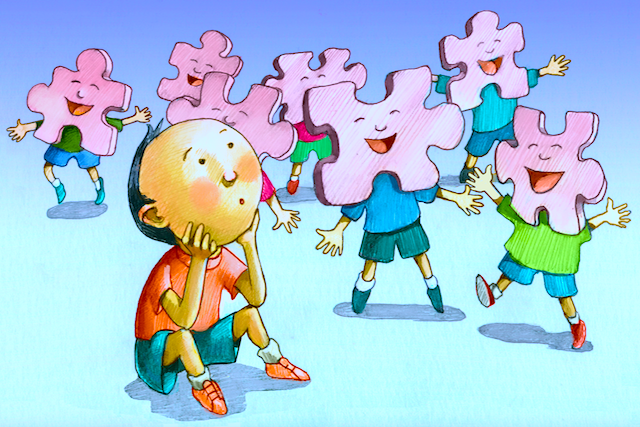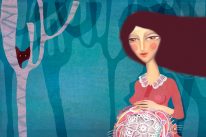
“I care for myself. The more solitary, the more friendless, the more unsustained I am, the more I will respect myself.” ~Charlotte Brontë, Jane Eyre
A common misconception about autistic people is that we don’t care if we’re alone. Of course this varies with each person, but on the whole, it’s untrue. We want to feel included, it’s just not easy for us to fit in. There are other days when I feel autism has separated me so fully from other people that I am functioning on a different plane of existence, not just with a different brain structure.
I attended a child’s birthday party recently, and it was a sensory nightmare. Children screaming, rain pouring, karaoke, a pinata, one incredibly friendly, one-ish looking, adorable baby boy who used me as a jungle gym. Before all of this was simultaneously happening, my family had arrived a few minutes early to secure a good parking spot.
The five of us unloaded from our van and went inside. There was mostly family there, no one unknown yet, only a half dozen people, still pretty quiet and cozy. My sister-in-laws were doing rounds with the multiple sets of in-laws and close friends everyone knows.
Recently diagnosed, I’ve been making more of an effort to put aside my discomforts and reach out in different ways to form stronger family bonds for my children. I usually retreat to my phone during children’s parties that are not my own children’s, but this time I attempted to mimic my sisters-in-law. I put my purse away and went in turns attempting to make conversation with my family.
The same experience happened with five different people. They would say something and I would reply with something in return. After each time I spoke it was as if I’d said nothing; they would speak after my comments as if I had interrupted them, despite me answering direct questions or comments.
I gave up on conversation when things started getting busy, and switched to attempting to give my niece the blanket I’d been crocheting for eighteen months. My niece is only almost one, so I gave it to her mom to open. She did not take it from my outstretched hand, nor did she show interest in it while I was there.
When all our kids were settled in the car and my husband was driving home, it began. Anxiety, guilt, self-doubt. What do I do wrong? Why can I not think of things to say that spur conversation? I’ve spent a large amount of time trying to understand facial expressions I was not built to read. Did I not read them well? And how could I still be failing at talking about the weather?
I asked my husband, what am I doing so wrong? I did all the same things that my neurotypical sisters-in-law did. Why did they not chat with me for fifteen minutes like they all did with everyone else? I showed interest in their lives, taking care to avoid my special interests.
I stewed over it, I cried and called myself a failure because I can’t seem to connect with people and can’t pass for normal, even though I now know why, after thirty years.
I was crushed that knowing why I was different made no impact when it came to bridging the difference. As I continued to think about this I eventually concluded that not knowing my diagnosis, or if I even had one, gave no one an excuse to treat me poorly.
Then I realized there was nothing wrong with how I attempted to connect. The problem wasn’t me; it was the people I was trying to interact with. I asked myself, who and what was I failing? People who wouldn’t even talk to me.
I then remembered that I get to choose how I react. I get to choose to feel bad or move on, and I needed to ask myself what I wanted to feel—and what I deserved to feel. So I decided right then I don’t want to be affected by people who simply don’t care for me.
I will probably never connect with my sister-in-laws, not one of the four. I’ve put in a lot of effort trying and failing. The way I choose to see it now, I was born with the ability to weed out shallow relationships.
I didn’t do anything wrong besides not be my true self. The traits I was born with should not determine other people’s treatment of me, just as my treatment of others is not dependent on them, just myself.
I will never pass for your typical wife or mother. I didn’t for the first thirty years of my life when I didn’t know I was autistic. I doubt I will in the next thirty years with an explanation for my traits and behavior. I am learning that is not just okay, but great.
I choose now to live like it’s not my job to sacrifice my comfort because I socialize differently. I don’t owe anyone “normalcy.” I don’t need to try to mask my autism by copying a seemingly normal routine. By attempting this I stole the joy out of my own experience. I felt anxious and frustrated and ultimately like a failure.
I still crave company, but good company will come on its own. They won’t expect me to fake anything, mimic anyone, or wonder or ask why I seem different. They will just be with me and accept me as I am.
Being autistic has impacted my entire life, and for most of my life I never understood what was happening. I got blessed with an extra set of challenges I had no choice over. But I do get to choose how strong those challenges make me.
I choose to get stronger every day. I choose to be my own hero. Every day, I choose to let go of my self-doubt and hold on to my true self.
About Shyanne Stillwell
Shyanne is a mother, birth mother, wife, author, and animal enthusiast. She has been reading and writing her entire life and was published first in a poetry book at age twelve and again at twenty-five. Diagnosed late in life with autism, she has devoted her time to helping people understand and accept autism without trying to change it. Visit her at throughtheautisticlookingglass.com.













 Though I run this site, it is not mine. It's ours. It's not about me. It's about us. Your stories and your wisdom are just as meaningful as mine.
Though I run this site, it is not mine. It's ours. It's not about me. It's about us. Your stories and your wisdom are just as meaningful as mine.
Beautiful! Thank you so much for sharing. I, too, am on a journey to be more authentic and compassionate toward myself, and your story is inspiring.
Wonderful article! Thank you for educating me on the intricacies of autism. I have a 24 year old nephew who I’ve been trying to help for years and I’m pretty sure he’s on the scale somewhere. His mother is in denial so it makes it quite difficult. Keep up the good work!
Thank you for reading. A lot of parents are in denial because they don’t want something to be “wrong” with their children. I try to remain positive that these people will come to see the positive things autism brings to the table as well someday.
How did you discover you were on the spectrum? My neighbor found out when she took her own daughter in for testing! After getting to know her, she feels that I am on the spectrum too. Lots of things make sense now that I have a reference point. So, I’m curious as to how I can find out where I am, if at all, on the spectrum.
In a roundabout way, my children’s therapies eventually made things ‘click’ for me. Although, I would really encourage you not to put too much weight into getting a diagnoses from a doctor if you can function really well.
It can be incredibly difficult for an adult in America to get diagnosed due to the new criteria.
Ultimately you know yourself best. If the therapies work, use them regardless if you have ever been ‘officially scaled’ or not.
To obtain a diagnoses, you can either reach out the your regional center for autism or ask your general practitioner for reference to a psychologist.
Great article, but what is the difference between “Mother” and Birth Mother?” I think I know but am curious.
You can easily google this if you want to know.
I have tried to participate in a conversation with sister in law for 10 years. I primarily ask her about herself, and I only bring up things about myself that she would take an interest in based on her career and own interests… I finally just gave up and don’t talk to her outside of bare basics like, “isn’t this nice, it’s raining, good restaurant pick, etc.” Her behavior says more about her than it does me. Sometimes it just doesn’t work out with some people. You seem like a lovely person who I would enjoy conversing with at a party… maybe a party without screaming kids though. Those types of events drive me bonkers! 🙂
Thank you! It is comforting to know I’m not alone in my ineffective efforts. I’ve made a lot of progress letting peoples actions speak to me when they won’t verbally. Life changing letting go of other people’s actions!
Great article! I received it today having yesterday been diagnosed with autism at the age of 46. A lot of the body of the article was explained to me by my psychiatrist in particular the struggle to ‘fit in’ and make conversation. I’ve always struggled to read people and desperately wanted to be accepted. Now I know I’m just different and am content with the friends I have. An additional thing not covered in the article concerns humour. Despite what acquaintances say, autistic people have a sense of humour – it’s just different. It explains why people laugh at things that don’t amuse me and I find humour in other places.
I have also always been told my sense of humor is “strange”. It is not, it is just my own. I have begun to find a lot more people who have a similar sense of humor, it has been hilarious and encouraging.
Your issues are very much like mine. I was diagnosed at age 70: I covered my autism with aggression to keep people away. Now, I have finally accepted and understand my situation and am developing a love for myself land my autism. Thank you for sharing your feelings and struggles.
Thank you so much for sharing your experience! Your strength is an inspiration to anyone who reads this.
I choose to be my own hero. Thank you for that sentence. It hit me just when I needed it most. Also, always remember that you are beautiful. You are blessed to be a mother, you write with excellence and authenticity. I’d be blessed to have a friend, or even a conversation with someone as true as you. Don’t ever change. 🙂
I am truly sorry, but I have no idea what you mean? What other post? And I asked about “Birth mother” in any event.